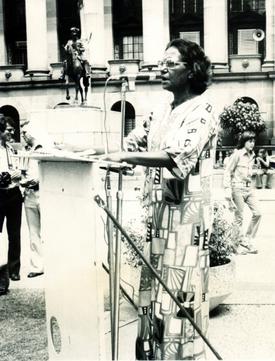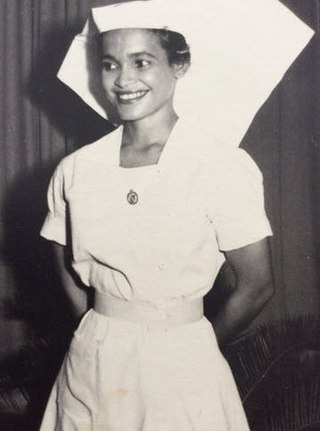Related Research Articles

Christine Anu is an Australian singer-songwriter and actress of Torres Strait Islander origin. She gained popularity with the cover song release of the Warumpi Band's song "My Island Home" in 1995. Anu has been nominated for many ARIA Awards, winning several, as well as five Deadly Awards, among others. In August 2024 she released a new album and single of the same name, Waku: Minaral a Minalay.

Oodgeroo Noonuccal ( UUD-gə-roo NOO-nə-kəl; born Kathleen Jean Mary Ruska, later Kath Walker was an Aboriginal Australian political activist, artist and educator, who campaigned for Aboriginal rights. Noonuccal was best known for her poetry, and was the first Aboriginal Australian to publish a book of verse.

Melanesian Meriam people are an Indigenous Australian group of Torres Strait Islander people who are united by a common language, strong ties of kinship and live as skilled hunter–fisher–gatherers in family groups or clans on a number of inner eastern Torres Strait Islands including Mer or Murray Island, Ugar or Stephen Island and Erub or Darnley Island. The Meriam people are perhaps best known for their involvement in the High Court of Australia's Mabo decision which fundamentally changed land law in Australia - recognising native title.
The Deadly Awards, formally titled National Aboriginal and Torres Strait Islander Music, Sport, Arts and Community Awards and commonly known simply as The Deadlys, was an annual celebration of Australian Aboriginal and Torres Strait Islander achievement in music, sport, entertainment and community. The event was hosted by Vibe Australia, founded by Gavin Jones in 1993, and was held from 1995 to 2013, when government funding was cut.
Deadly Awards 2004 the awards were an annual celebration of Australian Aboriginal and Torres Strait Islander achievement in music, sport, entertainment and community.
Patricia June O'Shane is a retired Australian teacher, barrister, public servant, jurist, and Aboriginal activist. She was Australia's first Aboriginal magistrate, serving the Local Court in Sydney, New South Wales, between 1986 until her retirement in 2013.

Larissa Yasmin Behrendt is an Australian legal academic, writer, filmmaker and Indigenous rights advocate. As of 2022 she is a professor of law and director of research and academic programs at the Jumbunna Institute for Indigenous Education and Research at the University of Technology Sydney, and holds the inaugural Chair in Indigenous Research at UTS.
Chris Sarra is an Australian educationalist, the founder and Chairman of the Stronger Smarter Institute. Sarra grew up in Bundaberg, Queensland as the youngest of ten children to parents of Italian and Aboriginal heritage, and he experienced many of the issues faced by Indigenous students throughout their schooling, such as racism and general discrimination.

Woorabinda is a rural town and locality in the Aboriginal Shire of Woorabinda, Queensland, Australia. It is an Aboriginal community. In the 2021 census, the locality of Woorabinda had a population of 1,019 people with 91.6% identifying as Aboriginal or Torres Strait Islander.

Stanley Vernard Grant SrAM is an elder of the Wiradjuri tribe of Indigenous Australians from what is now the south-west inland region of the state of New South Wales, Australia. The grandson of an elder who was gaoled for speaking his own language, Grant Sr now teaches the Wiradjuri language to students.
Indigenous Australians are people with familial heritage from, and/or recognised membership of, the various ethnic groups living within the territory of present day Australia prior to British colonisation. They consist of two distinct groups, which includes many ethnic groups: the Aboriginal Australians of the mainland and many islands, including Tasmania, and the Torres Strait Islanders of the seas between Queensland and Papua New Guinea, located in Melanesia.

Anita Marianne Heiss is an Aboriginal Australian author, poet, cultural activist and social commentator. She is an advocate for Indigenous Australian literature and literacy, through her writing for adults and children and her membership of boards and committees.
Stephen Hagan is an Australian author and anti-racism campaigner. He is also a newspaper editor, documentary maker, university lecturer and former diplomat.
Bidjara, also spelt Bidyara or Pitjara, is an Australian Aboriginal language. In 1980, it was spoken by 20 elders in Queensland between the towns of Tambo and Augathella, or the Warrego and Langlo Rivers. There are many dialects of the language, including Gayiri and Gunggari. Some of them are being revitalised and are being taught in local schools in the region. The various dialects are not all confirmed or agreed by linguists.
Aileen Moreton-Robinson is an Indigenous Australian academic, Indigenous feminist, author and activist for Indigenous rights. She is a Goenpul woman of the Quandamooka people from Minjerribah in Queensland. She completed a PhD at Griffith University in 1998, her thesis titled Talkin' up to the white woman: Indigenous women and feminism in Australia. The thesis was published as a book in 1999 and short-listed for the New South Wales Premier's Literary Awards and the Stanner Award. A 20th Anniversary Edition was released in 2020 by University of Queensland Press. Her 2015 monograph The White Possessive: Property, Power, and Indigenous Sovereignty was awarded the Native American and Indigenous Studies Association's (NAISA) prize in 2016.

MaryAnn Bin-Sallik is a Djaru Elder and Australian academic, specialising in Indigenous studies and culture. She was the first Indigenous Australian to gain a doctorate from Harvard University.

Terri Janke is an Indigenous Australian lawyer of Wuthathi/Meriam heritage. She is considered a leading international authority on Indigenous cultural and intellectual property (ICIP), and is the Solicitor Director of Terri Janke and Company.
Elsie Heiss, also known as Aunty Elsie, is an Indigenous Australian, a Wiradjuri elder and a Catholic religious leader. She has led Aboriginal Catholic Ministry programs for over three decades and was NAIDOC Female Elder of the Year in 2009.
Chelsea Joanne Ruth Watego is an Aboriginal Australian academic and writer. She is a Mununjali Yugambeh and South Sea Islander woman and is currently Professor of Indigenous Health at Queensland University of Technology. Her first book, Another Day in the Colony, was published in 2021.
References
- ↑ Verass, Sophie. "Expert in Indigenous education set to study at Harvard University". sbs.com.au. SBS. Retrieved 7 July 2017.
- ↑ "Podmore Foundation Announces Guest Speaker Jessa Rogers for Spring Lunch 2015". podmorefoundation.org. Archived from the original on 3 March 2016. Retrieved 29 February 2016.
- ↑ "NAIDOC Profile: Jessa Rogers". www.naidoc.org.au. Archived from the original on 3 March 2016. Retrieved 29 February 2016.
- ↑ "Jessa's journey - Deadly Vibe". Deadly Vibe. May 2014. Retrieved 29 February 2016.
- ↑ "News". QUT. Retrieved 29 February 2016.
- ↑ "EducationHQ Australia - Smith committed to her kids". au.educationhq.com. Retrieved 29 February 2016.
- ↑ "USQ links youths with local heritage - University of Southern Queensland". www.usq.edu.au. Archived from the original on 1 April 2016. Retrieved 17 March 2016.
- ↑ Price, Kaye (29 June 2015). Knowledge of Life: Aboriginal and Torres Strait Islander Australia. Cambridge University Press. ISBN 9781316381472.
- ↑ Bateman, Daniel (21 January 2016). "Australia's first Boarding School for Young Mums and Bubs". The Cairns Post.
- ↑ "Executive Leadership". capeyorkpartnership.org.au. Archived from the original on 27 February 2016. Retrieved 21 February 2016.
- ↑ Corporation, Australian Broadcasting (March 2011). "Why Jessica Smith became 2010 Naidoc Youth of the Year". Conversations with Richard Fidler. Retrieved 29 February 2016.
- ↑ Rogers, Jessa (2016). "Boarding School Business: The Voices of Aboriginal Girls Attending Boarding Schools". doi:10.25911/5d626f0c42a3f.
{{cite journal}}: Cite journal requires|journal=(help) - ↑ "Academic profiles - Dr Jessa Roger's".
- ↑ "Baayi Consulting". www.baayiconsulting.com. Retrieved 15 July 2021.
- ↑ "AsstProf Jessa Rogers". University of Canberra. Archived from the original on 24 October 2017. Retrieved 7 July 2017.
- ↑ "ANU Spaces - Jessa Rogers". ANU. 20 November 2014. Retrieved 21 February 2016.
- ↑ "Why Australia needs more Indigenous educators". www.mq.edu.au. Retrieved 21 February 2016.
- ↑ "Members of the Nursing and Midwifery Board of Australia". 15 July 2021.
- ↑ "Aboriginal and Torres Strait Islander Strategy". 15 July 2021.
- ↑ "AASJ". 15 July 2021.
- ↑ "NFF welcomes new panel to review regional connectivity". 2 March 2024.
- ↑ "Jessa's journey - Deadly Vibe". Deadly Vibe. May 2014. Retrieved 21 February 2016.
- ↑ "The Minoru Hokari Scholarship - School of History". history.cass.anu.edu.au. 17 March 2010. Retrieved 29 February 2016.
- ↑ "QUT Outstanding Alumni Awards". Archived from the original on 13 November 2016. Retrieved 28 August 2016.
- ↑ "HUNAP Welcomes Wiradjuri Scholar, Jessa Rogers | Harvard University Native American Program". Archived from the original on 23 March 2020. Retrieved 23 March 2020.
- ↑ "Rogers, Jessica's Fellowship Profile | WINSTON CHURCHILL MEMORIAL TRUST". Archived from the original on 23 March 2020. Retrieved 23 March 2020.